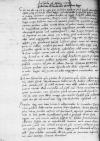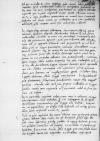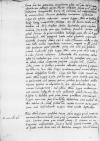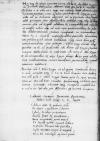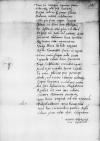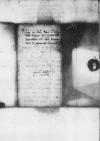 AAWO, AB, D. 6, f. 102v
AAWO, AB, D. 6, f. 102v
Instructio ad minora comitia
Instructio ad conventus particularis Poland (Kingdom of Poland, Polonia)⌊RegniPoland (Kingdom of Poland, Polonia)⌋
Cum non alia via sit et ratio, qua provideri possit, ne quid Poland (Kingdom of Poland, Polonia)⌊RegnumPoland (Kingdom of Poland, Polonia)⌋ detrimenti capiat, quaque vel commoda illius augeri, vel incommoda propulsari possint, quam si comitia edicantur, in quibus de rebus ad Poland (Kingdom of Poland, Polonia)⌊RegniPoland (Kingdom of Poland, Polonia)⌋ reique publicae salutem pertinentibus deliberatio suscipiatur. Maiorum suorum vestigiis insistens sacra Sigismund I Jagiellon (Zygmunt I) (*1467 – †1548), King of Poland and Grand Duke of Lithuania (1506-1548); Duke of Głogów (Glogau) (1499-1506), Duke of Opava (1501-1506), Governor of Silesia (1504-1506); son of King Kazimierz IV Jagiellon and Elisabeth of Austria⌊maiestas regiaSigismund I Jagiellon (Zygmunt I) (*1467 – †1548), King of Poland and Grand Duke of Lithuania (1506-1548); Duke of Głogów (Glogau) (1499-1506), Duke of Opava (1501-1506), Governor of Silesia (1504-1506); son of King Kazimierz IV Jagiellon and Elisabeth of Austria⌋ semper hactenus hanc est rationem prosecuta ac, quoties id Regni hidden by binding⌈[i]i hidden by binding⌉ rationes postulare videbat, comitia edixit, in quibus communi omnium quieti et tranquillitati prospici ac, si qua impenderent pericula, maturo consilio propelli possent. Sed statuere non superinscribed⌈nonnon superinscribed⌉ potest sacra Sigismund I Jagiellon (Zygmunt I) (*1467 – †1548), King of Poland and Grand Duke of Lithuania (1506-1548); Duke of Głogów (Glogau) (1499-1506), Duke of Opava (1501-1506), Governor of Silesia (1504-1506); son of King Kazimierz IV Jagiellon and Elisabeth of Austria⌊maiestas regiaSigismund I Jagiellon (Zygmunt I) (*1467 – †1548), King of Poland and Grand Duke of Lithuania (1506-1548); Duke of Głogów (Glogau) (1499-1506), Duke of Opava (1501-1506), Governor of Silesia (1504-1506); son of King Kazimierz IV Jagiellon and Elisabeth of Austria⌋ temporum, ne id iniquitati an fato alicui suo tribuat, quod continuis his annis aliquot nihil congregandis comitiis profectum neque ratio est aliqua excogitata, qua periclitanti patriae succurri posset. Cuius rei culpam penes se nullam residere persuasum habet sacra Sigismund I Jagiellon (Zygmunt I) (*1467 – †1548), King of Poland and Grand Duke of Lithuania (1506-1548); Duke of Głogów (Glogau) (1499-1506), Duke of Opava (1501-1506), Governor of Silesia (1504-1506); son of King Kazimierz IV Jagiellon and Elisabeth of Austria⌊maiestas regiaSigismund I Jagiellon (Zygmunt I) (*1467 – †1548), King of Poland and Grand Duke of Lithuania (1506-1548); Duke of Głogów (Glogau) (1499-1506), Duke of Opava (1501-1506), Governor of Silesia (1504-1506); son of King Kazimierz IV Jagiellon and Elisabeth of Austria⌋, quae quamlibet affecta sit et aetate, et valetudine, nihil tamen ei parcendo fecit semper omnia, quae ad suum officium pertinere intelligebat, neque commisit, ut id ulla in re a quoquam desiderari posset, privatas suas rationes omnes publicis postposuit. Quodsi eodem instituto fuissent omnes, ad quos de salute patriae consultatio pertinebat, inventa pridem esset ratio defendendae illius eiusmodi, nullus ut nobis hostis Dei fretis auxilio magnopere metuendus veniret.
Sed non defuerunt, qui quavis de re potius, quam cuius causa comitia edicta essent, consultationem haberent et haberi vellent, per quos factum est, ut nihil sit annis iam aliquot salubre constitutum praeter ultimum illud remedium, ad quod nisi summa necessitate urgente perveniri non consuevit, quod uti non perinde proclive est et solet usus illius magis esse noxius reipublicae quam salutaris, quod ita esse non semel iam neque uno documento comprobatum est.
Quamvis itaque non vani terrores adferrentur de conatibus The Ottoman Turks (Turcae) ⌊TurcarumThe Ottoman Turks (Turcae) ⌋, quibus deliberatum omnino fuisse dicebatur arcem Balacley, quae intra fines superinscribed in place of crossed-out m⌈mss superinscribed in place of crossed-out m⌉ nostros est oportuno et apprime natura munito in loco posita, exaedificare. Quod si perfectum ab eis esset, ingens ea res terris nostris Rus (Russia)⌊RussiaeRus (Russia)⌋ et Podolia (Podole), region in the south-eastern part of the Kingdom of Poland, between the Dniester and Boh rivers, with its capital in Kamieniec Podolski; today part of Ukraine and of Moldova⌊PodoliaePodolia (Podole), region in the south-eastern part of the Kingdom of Poland, between the Dniester and Boh rivers, with its capital in Kamieniec Podolski; today part of Ukraine and of Moldova⌋ detrimentum allatura fuisset, ita ut impediendi conatus eorum omni ratione fuerint, quod nisi collecto exercitu, qui armis cohiberet, fieri non potuit. Noluit tamen maiestas regia, quod damnosum id reipublicae fore videbat, remedio illo uti, quod in proximo superioris anni comitiis fuerat decretum.
 AAWO, AB, D. 6, f. 103r
Sed pro eo studio et cura singulari, qua suorum saluti prospectum cupiebat, fecit nihilominus, nullis ut sumptibus parceret, ac ex fisco suo non mediocrem pecuniam in milites alendos impendit, qui si quid eiusmodi conati essent The Ottoman Turks (Turcae) ⌊ThurcaeThe Ottoman Turks (Turcae) ⌋, arcere eos et a coepto prohibere conarentur, ac omnem fere comitatum aulicum ad fines misit ac militibus aere suo conductis adiunxit, quo maior eorum esse numerus videretur.
AAWO, AB, D. 6, f. 103r
Sed pro eo studio et cura singulari, qua suorum saluti prospectum cupiebat, fecit nihilominus, nullis ut sumptibus parceret, ac ex fisco suo non mediocrem pecuniam in milites alendos impendit, qui si quid eiusmodi conati essent The Ottoman Turks (Turcae) ⌊ThurcaeThe Ottoman Turks (Turcae) ⌋, arcere eos et a coepto prohibere conarentur, ac omnem fere comitatum aulicum ad fines misit ac militibus aere suo conductis adiunxit, quo maior eorum esse numerus videretur.
In Lithuania⌊Magno quoque Ducatu LithuaniaeLithuania⌋ serenissimi Sigismund II Augustus Jagiellon (Zygmunt II August) (*1520 – †1572), 1529-1572 Grand Duke of Lithuania (ruled from 1544); 1530-1572 King of Poland (crowned vivente rege (ruled from 1548, after the death of his father); son of Sigismund I Jagiellon and Bona Sforza⌊filii suiSigismund II Augustus Jagiellon (Zygmunt II August) (*1520 – †1572), 1529-1572 Grand Duke of Lithuania (ruled from 1544); 1530-1572 King of Poland (crowned vivente rege (ruled from 1548, after the death of his father); son of Sigismund I Jagiellon and Bona Sforza⌋ opera turmas equitum aliquot conscribendas itidem et ad fines mittendas curavit, ut cum res postularet, convenire et mutuo sibi succurrere possent, qua providentia Sigismund I Jagiellon (Zygmunt I) (*1467 – †1548), King of Poland and Grand Duke of Lithuania (1506-1548); Duke of Głogów (Glogau) (1499-1506), Duke of Opava (1501-1506), Governor of Silesia (1504-1506); son of King Kazimierz IV Jagiellon and Elisabeth of Austria⌊maiestatis eiusSigismund I Jagiellon (Zygmunt I) (*1467 – †1548), King of Poland and Grand Duke of Lithuania (1506-1548); Duke of Głogów (Glogau) (1499-1506), Duke of Opava (1501-1506), Governor of Silesia (1504-1506); son of King Kazimierz IV Jagiellon and Elisabeth of Austria⌋ factum est, ut cogitata The Ottoman Turks (Turcae) ⌊ThurcaeThe Ottoman Turks (Turcae) ⌋ non perfuerent ac ad locum illum, quae in Poland (Kingdom of Poland, Polonia)⌊RegniPoland (Kingdom of Poland, Polonia)⌋ perniciem munire contendebant, ne aspirarent quidem, atque ita annus hic Dei beneficio satis fuit quietus neque fuerunt fines ullis hostium latrociniis infesti, quod satis firma in eis praesidia collocata esse praesenserant. Ceterum fiscus Sigismund I Jagiellon (Zygmunt I) (*1467 – †1548), King of Poland and Grand Duke of Lithuania (1506-1548); Duke of Głogów (Glogau) (1499-1506), Duke of Opava (1501-1506), Governor of Silesia (1504-1506); son of King Kazimierz IV Jagiellon and Elisabeth of Austria⌊regiae maiestatisSigismund I Jagiellon (Zygmunt I) (*1467 – †1548), King of Poland and Grand Duke of Lithuania (1506-1548); Duke of Głogów (Glogau) (1499-1506), Duke of Opava (1501-1506), Governor of Silesia (1504-1506); son of King Kazimierz IV Jagiellon and Elisabeth of Austria⌋ tantis impensis ita iam exhaustus est, ut ex illo periclitanti Poland (Kingdom of Poland, Polonia)⌊RegnoPoland (Kingdom of Poland, Polonia)⌋ succurri deinceps posse sperandum non sit, multa insumpta est superiore anno pecunia, dum pro damnis in conflagratione oppidi Ochakiv (Oczaków), city fortress and harbour on the northern side of the Black Sea, on the Dnieper Estuary⌊OczakowOchakiv (Oczaków), city fortress and harbour on the northern side of the Black Sea, on the Dnieper Estuary⌋ datis legato Thurcico maiestas regia satisfaceret in donativa [...] undeciphered⌈[...][...] undeciphered⌉, quae quotannis The Tatars ⌊ThartarisThe Tatars ⌋ penduntur, maior etiam erogatur pecunia, alendis autem aere suo proprio militibus in Regni finibus tantum iam expensum est pecuniae, nihil ut fere factum sit reliqui.
Porro pericula crescunt indies, nam non a The Ottoman Turks (Turcae) ⌊ThurcisThe Ottoman Turks (Turcae) ⌋ magis aut The Tatars ⌊TartarisThe Tatars ⌋ sive The Valachs ⌊ValachisThe Valachs ⌋ quam ex Hungary (Kingdom of Hungary)⌊HungariaHungary (Kingdom of Hungary)⌋ et ab ipsis Christianis metuendum esse Poland (Kingdom of Poland, Polonia)⌊RegnoPoland (Kingdom of Poland, Polonia)⌋ nostro videtur, ingens ut sit periculum, ne duplici bello districti ad utrumque gerendum parum instructi simus et parati.
Quod ea, quae cogitavit hoc anno Suleiman the Magnificent (*1494 – †1566), 1520-1566 Sultan of the Ottoman Empire⌊ThurcaSuleiman the Magnificent (*1494 – †1566), 1520-1566 Sultan of the Ottoman Empire⌋, non perfecerit, prima gratia debetur Deo, cuius hoc est beneficium, quod aliis ille fuit curis distentus, quodque quibus id negotii dederat, iis terror quidam iniectus est propter exercitum in finibus collocatum, proxima sacrae Sigismund I Jagiellon (Zygmunt I) (*1467 – †1548), King of Poland and Grand Duke of Lithuania (1506-1548); Duke of Głogów (Glogau) (1499-1506), Duke of Opava (1501-1506), Governor of Silesia (1504-1506); son of King Kazimierz IV Jagiellon and Elisabeth of Austria⌊maiestatis regiaeSigismund I Jagiellon (Zygmunt I) (*1467 – †1548), King of Poland and Grand Duke of Lithuania (1506-1548); Duke of Głogów (Glogau) (1499-1506), Duke of Opava (1501-1506), Governor of Silesia (1504-1506); son of King Kazimierz IV Jagiellon and Elisabeth of Austria⌋, quae suo studio tuendae Poland (Kingdom of Poland, Polonia)⌊reipublicaePoland (Kingdom of Poland, Polonia)⌋ tanto suo impendio exercitum conscripsit.
 AAWO, AB, D. 6, f. 103v
Anno autem hoc proximo insequenti, quis est, qui Suleiman the Magnificent (*1494 – †1566), 1520-1566 Sultan of the Ottoman Empire⌊ThurcamSuleiman the Magnificent (*1494 – †1566), 1520-1566 Sultan of the Ottoman Empire⌋ quieturum polliceri possit, de quo constans fama est, quod proximo insequenti vere sit omnino ad aedificandam et muniendam arcem Balacley animum adiecturus. Hac autem aestate superiore campos Sigismund I Jagiellon (Zygmunt I) (*1467 – †1548), King of Poland and Grand Duke of Lithuania (1506-1548); Duke of Głogów (Glogau) (1499-1506), Duke of Opava (1501-1506), Governor of Silesia (1504-1506); son of King Kazimierz IV Jagiellon and Elisabeth of Austria⌊regiae maiestatisSigismund I Jagiellon (Zygmunt I) (*1467 – †1548), King of Poland and Grand Duke of Lithuania (1506-1548); Duke of Głogów (Glogau) (1499-1506), Duke of Opava (1501-1506), Governor of Silesia (1504-1506); son of King Kazimierz IV Jagiellon and Elisabeth of Austria⌋ in Podolia (Podole), region in the south-eastern part of the Kingdom of Poland, between the Dniester and Boh rivers, with its capital in Kamieniec Podolski; today part of Ukraine and of Moldova⌊PodoliaPodolia (Podole), region in the south-eastern part of the Kingdom of Poland, between the Dniester and Boh rivers, with its capital in Kamieniec Podolski; today part of Ukraine and of Moldova⌋ longe lateque occuparunt The Ottoman Turks (Turcae) ⌊ThurcaeThe Ottoman Turks (Turcae) ⌋, ita ut decem tantum miliaribus ab arce Braslaw abesse dicuntur, quae eorum iniuria ferenda non esse videtur. Quod si verum est, quod fertur de qui<nqu>ennalibus induciis, quas Suleiman the Magnificent (*1494 – †1566), 1520-1566 Sultan of the Ottoman Empire⌊illeSuleiman the Magnificent (*1494 – †1566), 1520-1566 Sultan of the Ottoman Empire⌋ cum Ferdinand I of Habsburg (*1503 – †1564), from 1521 Archduke of Austria, from 1526 King of Bohemia and Hungary, Croatia and Slavonia as Ferdinand I, 1531-1558 King of the Romans, 1558-1564 Holy Roman Emperor; son of Philip I the Handsome and Joanna the Mad of Castile, a younger brother of Charles V of Habsburg⌊regia Romaronum maiestateFerdinand I of Habsburg (*1503 – †1564), from 1521 Archduke of Austria, from 1526 King of Bohemia and Hungary, Croatia and Slavonia as Ferdinand I, 1531-1558 King of the Romans, 1558-1564 Holy Roman Emperor; son of Philip I the Handsome and Joanna the Mad of Castile, a younger brother of Charles V of Habsburg⌋ pepigerit, tanto nobis gravius impendet periculum, fortasse etiam non a solis The Ottoman Turks (Turcae) ⌊ThurcisThe Ottoman Turks (Turcae) ⌋, nullo enim alterius belli metu impeditus minore negotio se, quodquod instituit, perficere posse putabit. Quis autem erit, qui prohibere queat exhausto fisco Sigismund I Jagiellon (Zygmunt I) (*1467 – †1548), King of Poland and Grand Duke of Lithuania (1506-1548); Duke of Głogów (Glogau) (1499-1506), Duke of Opava (1501-1506), Governor of Silesia (1504-1506); son of King Kazimierz IV Jagiellon and Elisabeth of Austria⌊regiae maiestatisSigismund I Jagiellon (Zygmunt I) (*1467 – †1548), King of Poland and Grand Duke of Lithuania (1506-1548); Duke of Głogów (Glogau) (1499-1506), Duke of Opava (1501-1506), Governor of Silesia (1504-1506); son of King Kazimierz IV Jagiellon and Elisabeth of Austria⌋, nisi quae alia ratio per Dominationes Vestras fuerit inventa. Sollicitabit ille The Tatars ⌊TartarosThe Tatars ⌋, sollicitabit et The Valachs ⌊ValachosThe Valachs ⌋, qui cum in fide et potestate eius sint, ut, nolint velint, imperata faciant, necesse est. Quodsi nulla erunt in finibus praesidia collocata impune grassari hostibus et loca etiam Poland (Kingdom of Poland, Polonia)⌊RegniPoland (Kingdom of Poland, Polonia)⌋ penitiora, quod omen Deus obruat, depopulari licebit. Cuius autem haec culpa fuerit? Non certe Sigismund I Jagiellon (Zygmunt I) (*1467 – †1548), King of Poland and Grand Duke of Lithuania (1506-1548); Duke of Głogów (Glogau) (1499-1506), Duke of Opava (1501-1506), Governor of Silesia (1504-1506); son of King Kazimierz IV Jagiellon and Elisabeth of Austria⌊maiestatis regiaeSigismund I Jagiellon (Zygmunt I) (*1467 – †1548), King of Poland and Grand Duke of Lithuania (1506-1548); Duke of Głogów (Glogau) (1499-1506), Duke of Opava (1501-1506), Governor of Silesia (1504-1506); son of King Kazimierz IV Jagiellon and Elisabeth of Austria⌋, a qua facta iam sunt omnia, quae fieri potuerunt, sed eorum potius, quibus persuaderi nulla ratione potuit, ut aliquam et ipsi defendendae patriae curam susciperent. Sed adhuc Sigismund I Jagiellon (Zygmunt I) (*1467 – †1548), King of Poland and Grand Duke of Lithuania (1506-1548); Duke of Głogów (Glogau) (1499-1506), Duke of Opava (1501-1506), Governor of Silesia (1504-1506); son of King Kazimierz IV Jagiellon and Elisabeth of Austria⌊maiestas regiaSigismund I Jagiellon (Zygmunt I) (*1467 – †1548), King of Poland and Grand Duke of Lithuania (1506-1548); Duke of Głogów (Glogau) (1499-1506), Duke of Opava (1501-1506), Governor of Silesia (1504-1506); son of King Kazimierz IV Jagiellon and Elisabeth of Austria⌋ meliora sperat omnia sibique de Dominationibus Vestris pollicetur, quod terras illas Rus (Russia)⌊RussiaeRus (Russia)⌋ et Podolia (Podole), region in the south-eastern part of the Kingdom of Poland, between the Dniester and Boh rivers, with its capital in Kamieniec Podolski; today part of Ukraine and of Moldova⌊PodoliaePodolia (Podole), region in the south-eastern part of the Kingdom of Poland, between the Dniester and Boh rivers, with its capital in Kamieniec Podolski; today part of Ukraine and of Moldova⌋, quae sunt quasi quoddam antemurale Poland (Kingdom of Poland, Polonia)⌊RegniPoland (Kingdom of Poland, Polonia)⌋, non sint pro derelictis habiturae, nam si quid de illis actum sit, quod in hostium capita vertat Deus potius, iam erit defendendi Regni ratio multo difficilior.
AAWO, AB, D. 6, f. 103v
Anno autem hoc proximo insequenti, quis est, qui Suleiman the Magnificent (*1494 – †1566), 1520-1566 Sultan of the Ottoman Empire⌊ThurcamSuleiman the Magnificent (*1494 – †1566), 1520-1566 Sultan of the Ottoman Empire⌋ quieturum polliceri possit, de quo constans fama est, quod proximo insequenti vere sit omnino ad aedificandam et muniendam arcem Balacley animum adiecturus. Hac autem aestate superiore campos Sigismund I Jagiellon (Zygmunt I) (*1467 – †1548), King of Poland and Grand Duke of Lithuania (1506-1548); Duke of Głogów (Glogau) (1499-1506), Duke of Opava (1501-1506), Governor of Silesia (1504-1506); son of King Kazimierz IV Jagiellon and Elisabeth of Austria⌊regiae maiestatisSigismund I Jagiellon (Zygmunt I) (*1467 – †1548), King of Poland and Grand Duke of Lithuania (1506-1548); Duke of Głogów (Glogau) (1499-1506), Duke of Opava (1501-1506), Governor of Silesia (1504-1506); son of King Kazimierz IV Jagiellon and Elisabeth of Austria⌋ in Podolia (Podole), region in the south-eastern part of the Kingdom of Poland, between the Dniester and Boh rivers, with its capital in Kamieniec Podolski; today part of Ukraine and of Moldova⌊PodoliaPodolia (Podole), region in the south-eastern part of the Kingdom of Poland, between the Dniester and Boh rivers, with its capital in Kamieniec Podolski; today part of Ukraine and of Moldova⌋ longe lateque occuparunt The Ottoman Turks (Turcae) ⌊ThurcaeThe Ottoman Turks (Turcae) ⌋, ita ut decem tantum miliaribus ab arce Braslaw abesse dicuntur, quae eorum iniuria ferenda non esse videtur. Quod si verum est, quod fertur de qui<nqu>ennalibus induciis, quas Suleiman the Magnificent (*1494 – †1566), 1520-1566 Sultan of the Ottoman Empire⌊illeSuleiman the Magnificent (*1494 – †1566), 1520-1566 Sultan of the Ottoman Empire⌋ cum Ferdinand I of Habsburg (*1503 – †1564), from 1521 Archduke of Austria, from 1526 King of Bohemia and Hungary, Croatia and Slavonia as Ferdinand I, 1531-1558 King of the Romans, 1558-1564 Holy Roman Emperor; son of Philip I the Handsome and Joanna the Mad of Castile, a younger brother of Charles V of Habsburg⌊regia Romaronum maiestateFerdinand I of Habsburg (*1503 – †1564), from 1521 Archduke of Austria, from 1526 King of Bohemia and Hungary, Croatia and Slavonia as Ferdinand I, 1531-1558 King of the Romans, 1558-1564 Holy Roman Emperor; son of Philip I the Handsome and Joanna the Mad of Castile, a younger brother of Charles V of Habsburg⌋ pepigerit, tanto nobis gravius impendet periculum, fortasse etiam non a solis The Ottoman Turks (Turcae) ⌊ThurcisThe Ottoman Turks (Turcae) ⌋, nullo enim alterius belli metu impeditus minore negotio se, quodquod instituit, perficere posse putabit. Quis autem erit, qui prohibere queat exhausto fisco Sigismund I Jagiellon (Zygmunt I) (*1467 – †1548), King of Poland and Grand Duke of Lithuania (1506-1548); Duke of Głogów (Glogau) (1499-1506), Duke of Opava (1501-1506), Governor of Silesia (1504-1506); son of King Kazimierz IV Jagiellon and Elisabeth of Austria⌊regiae maiestatisSigismund I Jagiellon (Zygmunt I) (*1467 – †1548), King of Poland and Grand Duke of Lithuania (1506-1548); Duke of Głogów (Glogau) (1499-1506), Duke of Opava (1501-1506), Governor of Silesia (1504-1506); son of King Kazimierz IV Jagiellon and Elisabeth of Austria⌋, nisi quae alia ratio per Dominationes Vestras fuerit inventa. Sollicitabit ille The Tatars ⌊TartarosThe Tatars ⌋, sollicitabit et The Valachs ⌊ValachosThe Valachs ⌋, qui cum in fide et potestate eius sint, ut, nolint velint, imperata faciant, necesse est. Quodsi nulla erunt in finibus praesidia collocata impune grassari hostibus et loca etiam Poland (Kingdom of Poland, Polonia)⌊RegniPoland (Kingdom of Poland, Polonia)⌋ penitiora, quod omen Deus obruat, depopulari licebit. Cuius autem haec culpa fuerit? Non certe Sigismund I Jagiellon (Zygmunt I) (*1467 – †1548), King of Poland and Grand Duke of Lithuania (1506-1548); Duke of Głogów (Glogau) (1499-1506), Duke of Opava (1501-1506), Governor of Silesia (1504-1506); son of King Kazimierz IV Jagiellon and Elisabeth of Austria⌊maiestatis regiaeSigismund I Jagiellon (Zygmunt I) (*1467 – †1548), King of Poland and Grand Duke of Lithuania (1506-1548); Duke of Głogów (Glogau) (1499-1506), Duke of Opava (1501-1506), Governor of Silesia (1504-1506); son of King Kazimierz IV Jagiellon and Elisabeth of Austria⌋, a qua facta iam sunt omnia, quae fieri potuerunt, sed eorum potius, quibus persuaderi nulla ratione potuit, ut aliquam et ipsi defendendae patriae curam susciperent. Sed adhuc Sigismund I Jagiellon (Zygmunt I) (*1467 – †1548), King of Poland and Grand Duke of Lithuania (1506-1548); Duke of Głogów (Glogau) (1499-1506), Duke of Opava (1501-1506), Governor of Silesia (1504-1506); son of King Kazimierz IV Jagiellon and Elisabeth of Austria⌊maiestas regiaSigismund I Jagiellon (Zygmunt I) (*1467 – †1548), King of Poland and Grand Duke of Lithuania (1506-1548); Duke of Głogów (Glogau) (1499-1506), Duke of Opava (1501-1506), Governor of Silesia (1504-1506); son of King Kazimierz IV Jagiellon and Elisabeth of Austria⌋ meliora sperat omnia sibique de Dominationibus Vestris pollicetur, quod terras illas Rus (Russia)⌊RussiaeRus (Russia)⌋ et Podolia (Podole), region in the south-eastern part of the Kingdom of Poland, between the Dniester and Boh rivers, with its capital in Kamieniec Podolski; today part of Ukraine and of Moldova⌊PodoliaePodolia (Podole), region in the south-eastern part of the Kingdom of Poland, between the Dniester and Boh rivers, with its capital in Kamieniec Podolski; today part of Ukraine and of Moldova⌋, quae sunt quasi quoddam antemurale Poland (Kingdom of Poland, Polonia)⌊RegniPoland (Kingdom of Poland, Polonia)⌋, non sint pro derelictis habiturae, nam si quid de illis actum sit, quod in hostium capita vertat Deus potius, iam erit defendendi Regni ratio multo difficilior.
Quin illud etiam confidit sacra Sigismund I Jagiellon (Zygmunt I) (*1467 – †1548), King of Poland and Grand Duke of Lithuania (1506-1548); Duke of Głogów (Glogau) (1499-1506), Duke of Opava (1501-1506), Governor of Silesia (1504-1506); son of King Kazimierz IV Jagiellon and Elisabeth of Austria⌊maiestas regiaSigismund I Jagiellon (Zygmunt I) (*1467 – †1548), King of Poland and Grand Duke of Lithuania (1506-1548); Duke of Głogów (Glogau) (1499-1506), Duke of Opava (1501-1506), Governor of Silesia (1504-1506); son of King Kazimierz IV Jagiellon and Elisabeth of Austria⌋, quod viam et rationem non solum inventurae sint, quae latrocinia propulsari possint, verum etiam qua resisti queat, si maiore vi in Poland (Kingdom of Poland, Polonia)⌊RegnumPoland (Kingdom of Poland, Polonia)⌋ impressionem facere hostis fuerit conatus. Cui, ut paulo ante dixi, non ab hostibus magis Christiani
 AAWO, AB, D. 6, f. 104r
nominis, quam ab iis, qui propugnatores fidei Christianae videri volunt, periculum impendet.
AAWO, AB, D. 6, f. 104r
nominis, quam ab iis, qui propugnatores fidei Christianae videri volunt, periculum impendet.
Est enim quidam, qui se magistrum vocari vult Teutonic Order (Order of Brothers of the German House of Saint Mary in Jerusalem, Ordo domus Sanctae Mariae Theutonicorum Hierosolymitanorum), military order founded at the end of the 12th century⌊ordinis cuiusdam TeutoniciTeutonic Order (Order of Brothers of the German House of Saint Mary in Jerusalem, Ordo domus Sanctae Mariae Theutonicorum Hierosolymitanorum), military order founded at the end of the 12th century⌋ atque eo nomine ius habere se praetendit ad terras Prussiae, quae magno labore magnaque sanguinis Christiani profusione tandem aliquando in Poland (Kingdom of Poland, Polonia)⌊RegniPoland (Kingdom of Poland, Polonia)⌋ potestatem sunt redactae. Is aere suo conductam unam atque aliam turmam habuisse dicitur annos iam aliquot in castris Charles V of Habsburg (*1500 – †1558), ruler of the Burgundian territories (1506-1555), King of Spain as Charles I (1516-1556), King of Naples and Sicily, King of the Romans (1519-1530), Holy Roman Emperor of the German Nation (elected 1519, crowned 1530, abdicated 1556); son of Philip I the Handsome and Joanna the Mad of Castile⌊caesareae maiestatisCharles V of Habsburg (*1500 – †1558), ruler of the Burgundian territories (1506-1555), King of Spain as Charles I (1516-1556), King of Naples and Sicily, King of the Romans (1519-1530), Holy Roman Emperor of the German Nation (elected 1519, crowned 1530, abdicated 1556); son of Philip I the Handsome and Joanna the Mad of Castile⌋ ac strenuam illi operam navasse non alia spe mercedis, quam quod auxilio sibi maiestatem eius fore confidit in Prussiae terris, quibus vehementer inhiat, potiatur. In quas cum impressionem omnino facere decrevisse minime vano rumore Sigismund I Jagiellon (Zygmunt I) (*1467 – †1548), King of Poland and Grand Duke of Lithuania (1506-1548); Duke of Głogów (Glogau) (1499-1506), Duke of Opava (1501-1506), Governor of Silesia (1504-1506); son of King Kazimierz IV Jagiellon and Elisabeth of Austria⌊maiestas regiaSigismund I Jagiellon (Zygmunt I) (*1467 – †1548), King of Poland and Grand Duke of Lithuania (1506-1548); Duke of Głogów (Glogau) (1499-1506), Duke of Opava (1501-1506), Governor of Silesia (1504-1506); son of King Kazimierz IV Jagiellon and Elisabeth of Austria⌋ cognovit. Quam ob rem ex illa quoque parte provideri necesse est, ne quid Poland (Kingdom of Poland, Polonia)⌊RegnumPoland (Kingdom of Poland, Polonia)⌋ hoc et quae ad corpus eius pertinent Royal Prussia (Prussia Regalis), region, part of Prussia annexed to the Kingdom of Poland in 1466 under the provisions of the Second Peace of Thorn⌊Prussiae terraeRoyal Prussia (Prussia Regalis), region, part of Prussia annexed to the Kingdom of Poland in 1466 under the provisions of the Second Peace of Thorn⌋ detrimenti capiant. Ita utraque ex parte gravia nobis impendere pericula videntur, ut nullus sit segnitiae locus, sed vigilare nos et in procinctu esse nos oportet undecumque hostis invaserit, ut eius impetum non modo sustinere, verum etiam propulsare possimus.
Sed gravis ira Dei hactenus obstitit quominus consiliis nostris aliquid profectum sit, quod eius placandae nulla est adhuc ratio inventa. Nam et caedes nihilo nunc remissius fiunt, quamquam antea et periuria frequentantur, quandoquidem impune peierare licet et de eo, quod ius suum obtinere non possunt, multum homines queruntur. Quam ob rem his quoque malis qua ratione mederi queat, consultationem haberi Sigismund I Jagiellon (Zygmunt I) (*1467 – †1548), King of Poland and Grand Duke of Lithuania (1506-1548); Duke of Głogów (Glogau) (1499-1506), Duke of Opava (1501-1506), Governor of Silesia (1504-1506); son of King Kazimierz IV Jagiellon and Elisabeth of Austria⌊maiestas regiaSigismund I Jagiellon (Zygmunt I) (*1467 – †1548), King of Poland and Grand Duke of Lithuania (1506-1548); Duke of Głogów (Glogau) (1499-1506), Duke of Opava (1501-1506), Governor of Silesia (1504-1506); son of King Kazimierz IV Jagiellon and Elisabeth of Austria⌋ vult. Sigismund I Jagiellon (Zygmunt I) (*1467 – †1548), King of Poland and Grand Duke of Lithuania (1506-1548); Duke of Głogów (Glogau) (1499-1506), Duke of Opava (1501-1506), Governor of Silesia (1504-1506); son of King Kazimierz IV Jagiellon and Elisabeth of Austria⌊CuiSigismund I Jagiellon (Zygmunt I) (*1467 – †1548), King of Poland and Grand Duke of Lithuania (1506-1548); Duke of Głogów (Glogau) (1499-1506), Duke of Opava (1501-1506), Governor of Silesia (1504-1506); son of King Kazimierz IV Jagiellon and Elisabeth of Austria⌋ persuasum est, nisi propitium Deum habeamus, qui propter ea, quae paulo superius enumerata sunt, et alia multa vitia nostra et flagitia graviter nobis irascitur, nihil in his comitiis, quod quidem e republica sit, statui posse.
 AAWO, AB, D. 6, f. 104v
His itaque de causis comitia sacra Sigismund I Jagiellon (Zygmunt I) (*1467 – †1548), King of Poland and Grand Duke of Lithuania (1506-1548); Duke of Głogów (Glogau) (1499-1506), Duke of Opava (1501-1506), Governor of Silesia (1504-1506); son of King Kazimierz IV Jagiellon and Elisabeth of Austria⌊maiestas regiaSigismund I Jagiellon (Zygmunt I) (*1467 – †1548), King of Poland and Grand Duke of Lithuania (1506-1548); Duke of Głogów (Glogau) (1499-1506), Duke of Opava (1501-1506), Governor of Silesia (1504-1506); son of King Kazimierz IV Jagiellon and Elisabeth of Austria⌋ de consilio regni sui senatorum Piotrków (Petricovia), city in central Poland, in the 15th-16th century the location of the assemblies of the Diet (Sejm) of the Kingdom of Poland, today Piotrków Trybunalski⌊PithrcoviaePiotrków (Petricovia), city in central Poland, in the 15th-16th century the location of the assemblies of the Diet (Sejm) of the Kingdom of Poland, today Piotrków Trybunalski⌋ celebrari vult pro festo Divi Nicolai. Postulat a Dominationibus Vestris, ut e corpore suo nuntios eligant plena et non limitata potestate, viros graves, prudentes et integros, qui nullo vel in ordinem aliquem, vel in personam odio flagrent, nihil privatis suis affectionibus tribuant neque alia consilia omnia, quam ad reipublicae salutem et tranquillitatem referant, ac omissis rebus aliis ad rem non pertinentibus de sola illa deliberationem statim suscipiant in servandam illam et a cunctis impendentibus periculis tuendam toto pectore, quod aiunt, incumbant, neque curae huic quicquam antevertendum esse putent. Tales ergo nuntios eligi postulat, ut hi ad praefinitum sibi diem ad Diet of Poland ⌊Regni comitia maioraDiet of Poland ⌋ Piotrków (Petricovia), city in central Poland, in the 15th-16th century the location of the assemblies of the Diet (Sejm) of the Kingdom of Poland, today Piotrków Trybunalski⌊PithrcoviamPiotrków (Petricovia), city in central Poland, in the 15th-16th century the location of the assemblies of the Diet (Sejm) of the Kingdom of Poland, today Piotrków Trybunalski⌋ se conferant, ibi cum sacra Sigismund I Jagiellon (Zygmunt I) (*1467 – †1548), King of Poland and Grand Duke of Lithuania (1506-1548); Duke of Głogów (Glogau) (1499-1506), Duke of Opava (1501-1506), Governor of Silesia (1504-1506); son of King Kazimierz IV Jagiellon and Elisabeth of Austria⌊maiestate regiaSigismund I Jagiellon (Zygmunt I) (*1467 – †1548), King of Poland and Grand Duke of Lithuania (1506-1548); Duke of Głogów (Glogau) (1499-1506), Duke of Opava (1501-1506), Governor of Silesia (1504-1506); son of King Kazimierz IV Jagiellon and Elisabeth of Austria⌋ et cum senatoribus et aliis Poland (Kingdom of Poland, Polonia)⌊RegniPoland (Kingdom of Poland, Polonia)⌋ nuntiis de iis, quae ad partiae incolumitatem conservandam pertinebunt, consultationem habiturae.
AAWO, AB, D. 6, f. 104v
His itaque de causis comitia sacra Sigismund I Jagiellon (Zygmunt I) (*1467 – †1548), King of Poland and Grand Duke of Lithuania (1506-1548); Duke of Głogów (Glogau) (1499-1506), Duke of Opava (1501-1506), Governor of Silesia (1504-1506); son of King Kazimierz IV Jagiellon and Elisabeth of Austria⌊maiestas regiaSigismund I Jagiellon (Zygmunt I) (*1467 – †1548), King of Poland and Grand Duke of Lithuania (1506-1548); Duke of Głogów (Glogau) (1499-1506), Duke of Opava (1501-1506), Governor of Silesia (1504-1506); son of King Kazimierz IV Jagiellon and Elisabeth of Austria⌋ de consilio regni sui senatorum Piotrków (Petricovia), city in central Poland, in the 15th-16th century the location of the assemblies of the Diet (Sejm) of the Kingdom of Poland, today Piotrków Trybunalski⌊PithrcoviaePiotrków (Petricovia), city in central Poland, in the 15th-16th century the location of the assemblies of the Diet (Sejm) of the Kingdom of Poland, today Piotrków Trybunalski⌋ celebrari vult pro festo Divi Nicolai. Postulat a Dominationibus Vestris, ut e corpore suo nuntios eligant plena et non limitata potestate, viros graves, prudentes et integros, qui nullo vel in ordinem aliquem, vel in personam odio flagrent, nihil privatis suis affectionibus tribuant neque alia consilia omnia, quam ad reipublicae salutem et tranquillitatem referant, ac omissis rebus aliis ad rem non pertinentibus de sola illa deliberationem statim suscipiant in servandam illam et a cunctis impendentibus periculis tuendam toto pectore, quod aiunt, incumbant, neque curae huic quicquam antevertendum esse putent. Tales ergo nuntios eligi postulat, ut hi ad praefinitum sibi diem ad Diet of Poland ⌊Regni comitia maioraDiet of Poland ⌋ Piotrków (Petricovia), city in central Poland, in the 15th-16th century the location of the assemblies of the Diet (Sejm) of the Kingdom of Poland, today Piotrków Trybunalski⌊PithrcoviamPiotrków (Petricovia), city in central Poland, in the 15th-16th century the location of the assemblies of the Diet (Sejm) of the Kingdom of Poland, today Piotrków Trybunalski⌋ se conferant, ibi cum sacra Sigismund I Jagiellon (Zygmunt I) (*1467 – †1548), King of Poland and Grand Duke of Lithuania (1506-1548); Duke of Głogów (Glogau) (1499-1506), Duke of Opava (1501-1506), Governor of Silesia (1504-1506); son of King Kazimierz IV Jagiellon and Elisabeth of Austria⌊maiestate regiaSigismund I Jagiellon (Zygmunt I) (*1467 – †1548), King of Poland and Grand Duke of Lithuania (1506-1548); Duke of Głogów (Glogau) (1499-1506), Duke of Opava (1501-1506), Governor of Silesia (1504-1506); son of King Kazimierz IV Jagiellon and Elisabeth of Austria⌋ et cum senatoribus et aliis Poland (Kingdom of Poland, Polonia)⌊RegniPoland (Kingdom of Poland, Polonia)⌋ nuntiis de iis, quae ad partiae incolumitatem conservandam pertinebunt, consultationem habiturae.
Postulat autem sacra Sigismund I Jagiellon (Zygmunt I) (*1467 – †1548), King of Poland and Grand Duke of Lithuania (1506-1548); Duke of Głogów (Glogau) (1499-1506), Duke of Opava (1501-1506), Governor of Silesia (1504-1506); son of King Kazimierz IV Jagiellon and Elisabeth of Austria⌊maiestas regiaSigismund I Jagiellon (Zygmunt I) (*1467 – †1548), King of Poland and Grand Duke of Lithuania (1506-1548); Duke of Głogów (Glogau) (1499-1506), Duke of Opava (1501-1506), Governor of Silesia (1504-1506); son of King Kazimierz IV Jagiellon and Elisabeth of Austria⌋, ut ad ipsum Diet of Poland ⌊comitiorumDiet of Poland ⌋ diem Dominationes Vestrae veniant, neque enim ex Dominationibus Vestris longius iter habiturus est, quam sacra Sigismund II Augustus Jagiellon (Zygmunt II August) (*1520 – †1572), 1529-1572 Grand Duke of Lithuania (ruled from 1544); 1530-1572 King of Poland (crowned vivente rege (ruled from 1548, after the death of his father); son of Sigismund I Jagiellon and Bona Sforza⌊maiestas regia iuniorSigismund II Augustus Jagiellon (Zygmunt II August) (*1520 – †1572), 1529-1572 Grand Duke of Lithuania (ruled from 1544); 1530-1572 King of Poland (crowned vivente rege (ruled from 1548, after the death of his father); son of Sigismund I Jagiellon and Bona Sforza⌋, quae et ipsa venturam se esse ad haec comitia facturamque, ut diem praevertat, promisit. Veniant itaque tempori, consultius enim videtur ipso die, qui praefinitus est, comitia incipere.
 AAWO, AB, D. 6, f. 103r
Sed pro eo studio et cura singulari, qua suorum saluti prospectum cupiebat, fecit nihilominus, nullis ut sumptibus parceret, ac ex fisco suo non mediocrem pecuniam in milites alendos impendit, qui si quid eiusmodi conati essent
AAWO, AB, D. 6, f. 103r
Sed pro eo studio et cura singulari, qua suorum saluti prospectum cupiebat, fecit nihilominus, nullis ut sumptibus parceret, ac ex fisco suo non mediocrem pecuniam in milites alendos impendit, qui si quid eiusmodi conati essent  AAWO, AB, D. 6, f. 103v
Anno autem hoc proximo insequenti, quis est, qui
AAWO, AB, D. 6, f. 103v
Anno autem hoc proximo insequenti, quis est, qui  AAWO, AB, D. 6, f. 104r
nominis, quam ab iis, qui propugnatores fidei Christianae videri volunt, periculum impendet.
AAWO, AB, D. 6, f. 104r
nominis, quam ab iis, qui propugnatores fidei Christianae videri volunt, periculum impendet. AAWO, AB, D. 6, f. 104v
His itaque de causis comitia sacra
AAWO, AB, D. 6, f. 104v
His itaque de causis comitia sacra 
